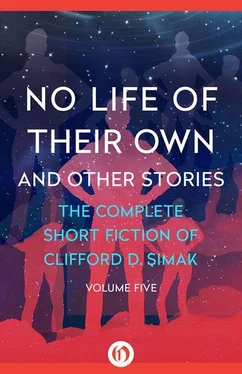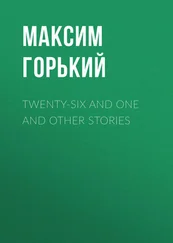“It was about the time I came to this realization that old Eli stumbled in. His car had broken down, his spacesuit was down to the last half-hour of oxygen. With him he had some peculiar salts—a queer earth such as he had never seen before. He had only a sample. I offered to analyze it for him and he left it. Quite by accident I discovered its properties.
“At about the time a very close friend of mine was brought here with the sickness. It was then that the full force of my failure was brought home to me. I knew my friend would die despite all that I could do. But he had hopes that I could save him—and that only made it worse.”
He stopped and stared at something on the opposite wall, but there was nothing there.
So I reminded him: “These salts of Eli’s? They prolonged life?”
It was as if something had struck him with a whip. He started and then settled back.
“Yes, they do,” he said. “The extent of their possibilities I cannot say. I can tell you roughly what they do, but I don’t understand just how—
“Perhaps we had better start at the beginning.
“If one is to accept the hypothesis that death is the result of the final hydrolysis of the proteins in the protoplasm, then it would seem reasonable that anything which would arrest hydrolysis or would catalyze resynthesis of the proteins would hold death at bay.
“The salts apparently do this, but whether they merely arrest the process of hydrolysis, preventing one from growing older, or whether they completely resynthesize a portion of the original proteins contained in the protoplasm I cannot even guess.
“If resynthesis actually does occur, then one might speculate upon the possibility that a larger dosage, by resynthesizing all or nearly all of the proteins would cause a man to grow younger instead of merely stopping him from growing older.”
He smiled. “I never experimented. I was satisfied with arresting old age.”
I didn’t say a thing. I almost held my breath. It seemed incredible the man could be sitting there, telling me that story. There was something wrong. Either he was wacky or I was batty—or maybe both.
I wanted to pinch myself to make sure it wasn’t all a dream, because, if it wasn’t, here was the biggest story the world had ever read.
Here was the sort of thing Ponce de Leon, the old Earth explorer, had dreamed about. Here, in hard truth, was an age-old myth that had echoed down the world for ages.
He was quiet so long that I finally spoke. “So you took some of the salts. Possibly so you could continue your work?”
“That’s it,” he said. “I talked it over with my friend, the one who expected me to help him—the one I knew I couldn’t help
“He understood and agreed to do his part. I was to prolong my life so I could continue with my work. He was to continue his so I could use him as a subject for experiments. It wasn’t an easy decision for him to make, for it meant years of torturing illness. The salts seemed to help him to some extent, perhaps repairing some of the ravages of the disease and for a while we thought they might be the cure. But they failed us, too. He lived—it’s true—but he wasn’t cured.”
“But why was it necessary to continue his life?” I asked. “Necessary for the experiments, I mean. Certainly you had plenty of other patients to experiment upon.”
“They died too fast,” said Anderson. “A few months, a few years at the most. I needed long range observation.”
He matched fingertips, speaking slowly, as if choosing his words with care.
“Perhaps you wonder why I did not pass my work along, why I did not select someone else and train them so they could pick up where I left off. Maybe that would have been the best. I’ve often blamed myself for not doing it instead of this. But my research had become an obsession. It wasn’t all pride or scientific ardor. There was the human angle to it, too. No man could have seen those poor devils, doomed, without a single chance, and not wanted to do something for them. They weren’t just patients. They were human beings, crying for someone to do something—and no one had. I tried to—God knows how I tried.
“I was afraid, you see, that someone else, no matter how carefully selected, might not be able to carry on with the singleness of purpose that seemed necessary—that somewhere along the way they might falter, might get sick of the job. That couldn’t be, that was the one thing that simply could not happen. Someone at least had to keep on trying to help those men for whom there was no help.”
“So you killed yourself off,” I said. “You let yourself be buried. You saw the stele erected in your honor. You became Dr. Brown and later Dr. Vincent. And yet, when I called you Dr. Anderson you answered.”
“I’ve always been Anderson,” he said. “The robots, of course, call me by the name I go by at the moment, but my friend who has stood by me all these years always calls me Anderson.”
He grimaced. “He never could get used to my other names.”
“And Eli?”
“Eli was easy to manage. I made him believe he had a malignant ailment, cautioned him he must come here at regular intervals for injections. The injections, of course, were his own salts. They have to be taken at intervals. After a time the hydrolysis would reach a point where it was necessary to set the catalytic action back to work again.”
He rose from the desk and paced up and down the room.
“But now Eli is dead. And I have failed. And someone else knows about the salts.”
He stopped in front of me.
“Do you realize what the knowledge of the salts will do to the Solar System?” he demanded. “Can you see what I have feared all these years?”
“What are you talking about?” I asked. “The salts would be the greatest blessing the world has ever known—”
He stared at me.
“Greatest blessing, did you say?” he whispered.
His fists clenched and unclenched by his side.
“They would be the greatest curse that could fall on mankind. Can you see what men would do to get them? No crime too foul, no treachery too great. Can you imagine what those in power would charge for them? Charge in money and service and power? The man who had them would rule the Solar System, for he could hold forth or withdraw the hope of eternal youth, of eternal life.
“Can you even remotely imagine the economic consequences? Men beggaring themselves for a few more years of life. Life insurance companies crashing as the people grabbed at the hope of living forever. For if a man is to live forever why bother with insurance? And when the insurance companies crashed they would drag others with them—companies that hold their paper—and other companies that—But why go on. Surely you must see.
“Envision the wars that might result. The mad hunt for the magic salts—”
“Wait a minute,” I shouted at him. “You’re forgetting that the man who killed Eli probably didn’t find out where Eli got the salts. He stole the salts that Eli had, but he probably doesn’t know—”
“That makes no difference,” said Anderson. “No difference at all. Once the System knows such salts exist all hell will break wide open. Mercury will be swamped with men looking for them—”
He stopped his tirade, walked around the desk and sat down.
“I hope you’ve enjoyed my story, Mr. Marshall.”
I gulped at that one. “Enjoyed it! Why, it’s the greatest story the System’s ever known. They’ll give it headlines two feet high. They’ll spread it—”
I stopped because I didn’t like the look that had crept into his eyes.
“You realize, of course, Mr. Marshall, that you shall never print it.”
“Never print it,” I yelped. “What did you tell it to me for?”
Читать дальше












